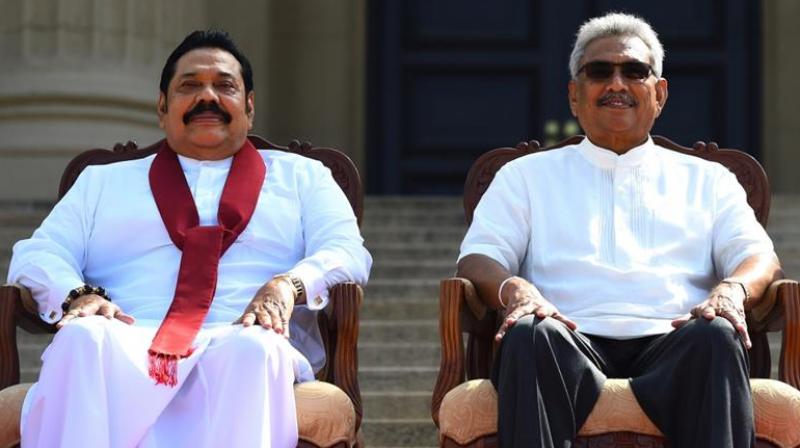Sri Lanka's proposed alternative of 19th Amendment faces level of resistance within ruling party
14 September, 2020

The Sri Lankan government's proposed 20th Constitution Amendment has faced internal resistance from within a faction of the ruling SLPP parliamentary group itself, before its inclusion in Parliament's order paper, the party members said on Sunday.
The federal government on September 2 gazetted the 20th Constitution Amendment draft, the new proposed legislation that would replace the 19th Amendment introduced in 2015 that curtailed the powers of the President and strengthened the role of Parliament.
The 19A was seen as the virtually all progressive pro-democracy reformist approach since Sri Lanka came to be governed under the all-powerful executive presidency in 1978. It depoliticised the government administration by guaranteeing the independence of key element pillars such as the judiciary, public assistance and elections.
The 20th Amendment proposes to restore whole legal immunity to the President, removing the provisions manufactured in the 19A to take legal action against the President.
The office of Prime Minister Mahinda Rajapaksa in a statement on Saturday night said that a nine-member ministerial committee has been appointed to review the 20A in its present form and, if needed, a fresh gazette will be issued.
Ever since the government gazetted the 20A, a number of the ruling SLPP's own parliamentarians and the party's allies have been publicly expressing unhappiness over its certain provisions, the party members said.
If the 20A is implemented in its present form, Primary Minister Mahinda Rajapaksa is definitely the hardest-hit as his current powers as the premier will be diminished along with his younger brother and the President, Gotabaya Rajapaksa, assuming full executive power, they said.
Moreover, Mahinda Rajapaksa, who is also a two-period president, will never be in a position to contest for the presidential election once again as both term bar offers been retained in the 20A draft, the party members said.
The draft legislation was to be located in Parliament's order book this week for debate and adaptation. However, it faced internal resistance from within a faction of the SLPP parliamentary group. And today, with Primary Minister Mahinda Rajapaksa, who is also the first choice of the Sri Lanka People's Get together (SLPP), appointing a committee, this technique could possibly be delayed, they said.
The committee is likely to submit its report by September 15.
The 20A has proposed several changes such as the replacement of the vital Constitutional Council (CC) with a fresh body called the Parliamentary council.
"The PC will consist only of people of parliament without place for civil society representatives," according to local media reports.
Also, three independent commissions, such as the Election Commission, will be abolished.
Relating to 20A, the chairpersons and customers of the commissions will be appointed simply by the president. To make such appointments, the president shall get the observations of the Parliamentary Council (PC).
Earlier under the 19A, each one of these appointments were the duty of the CC.
President Gotabaya Rajapaksa outlined his determination to abolish the 19th Amendment during his ceremonial address to Parliament last month.
The 19A Amendment adopted in 2015 by the then reformist government was at the mercy of substantially criticism by the powerful Rajapaksa clan since it prevented dual citizens from contesting elections. At that time, two of the Rajapaksa members of the family, including the current president, had been dual citizens of the US and Sri Lanka.
Gotabaya Rajapaksa had to renounce his US citizenship to contest the presidential election in November previous.
His younger brother and SLPP founder and its own National Organiser, Basil Rajapaksa, is a dual citizen of the united states and Sri Lanka. There will be five of these already in the federal government.
Through the August 5 general election, the SLPP sought two thirds parliamentary mandate or 150 chairs in the 225-member assembly to impact constitutional alters, the foremost of them was the move to abolish the 19A.
The SLPP and allies won 150 seats and have a two-third majority to effect the constitutional change they really want.
While Gotabaya Rajapaksa was elected as the Sri Lankan President in November this past year, his eldest brother Mahinda Rajapaksa won the overall election and assumed fee as Primary Minister on August 9.
Significantly, beneath the 20A draft, there is absolutely no provision on the proper to Information Commission, that was established simply by the 19A, while two important commissions -- Audit Service Commission and National Procurement Commission -- established simply by the 19A have already been abolished.
Beneath the 20A draft, no fundamental rights petition could be filed against the president.
Article 35 found in it says while anybody holds office due to president, no proceedings will be instituted or perhaps continued against him in any court or tribunal in respect of anything done or perhaps omitted to be achieved by him either found in his official or private capacity, based on the draft of 20A.
As well, the president is empowered to dissolve Parliament at his will after one year of a fresh Parliament is elected, which means the president may take away the prime minister and his cabinet at his will even nonetheless a Parliament will be elected for a five-year term.
The 20A draft provisions also do away with the limitation on the number of cabinet ministers.
The 19A limitations on the number of the cabinet (30) and deputy ministers (45) have been dropped. The president is normally empowered to appoint a variety of ministers, in line with the draft.
Source:
TAG(s):
